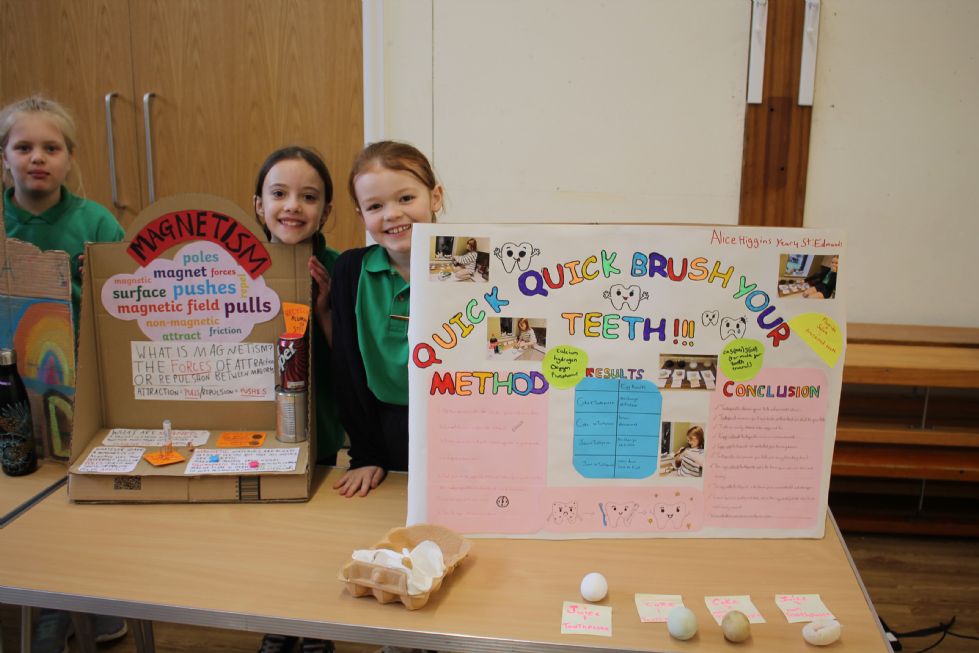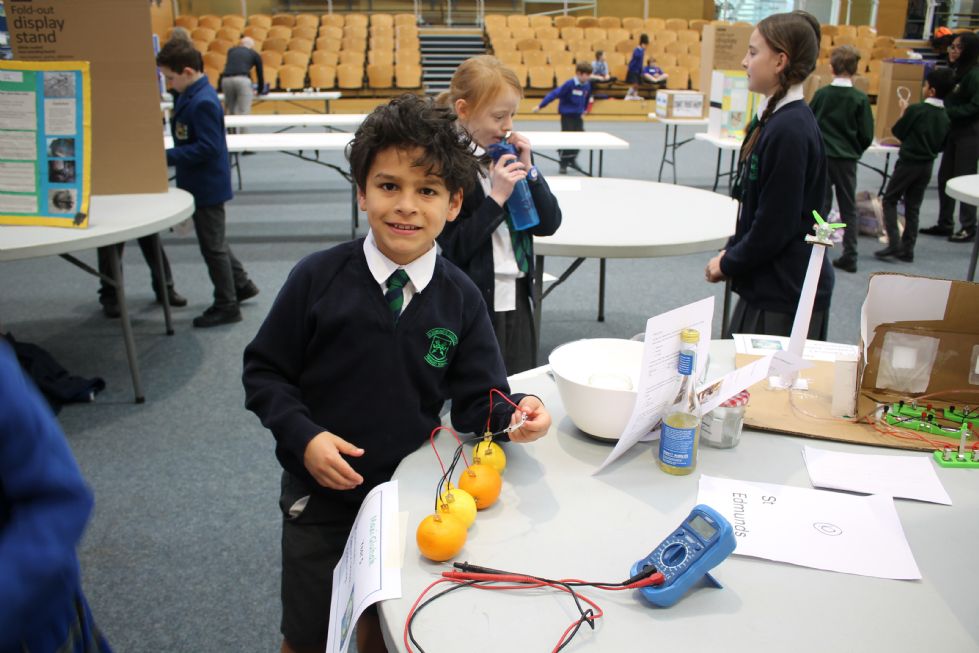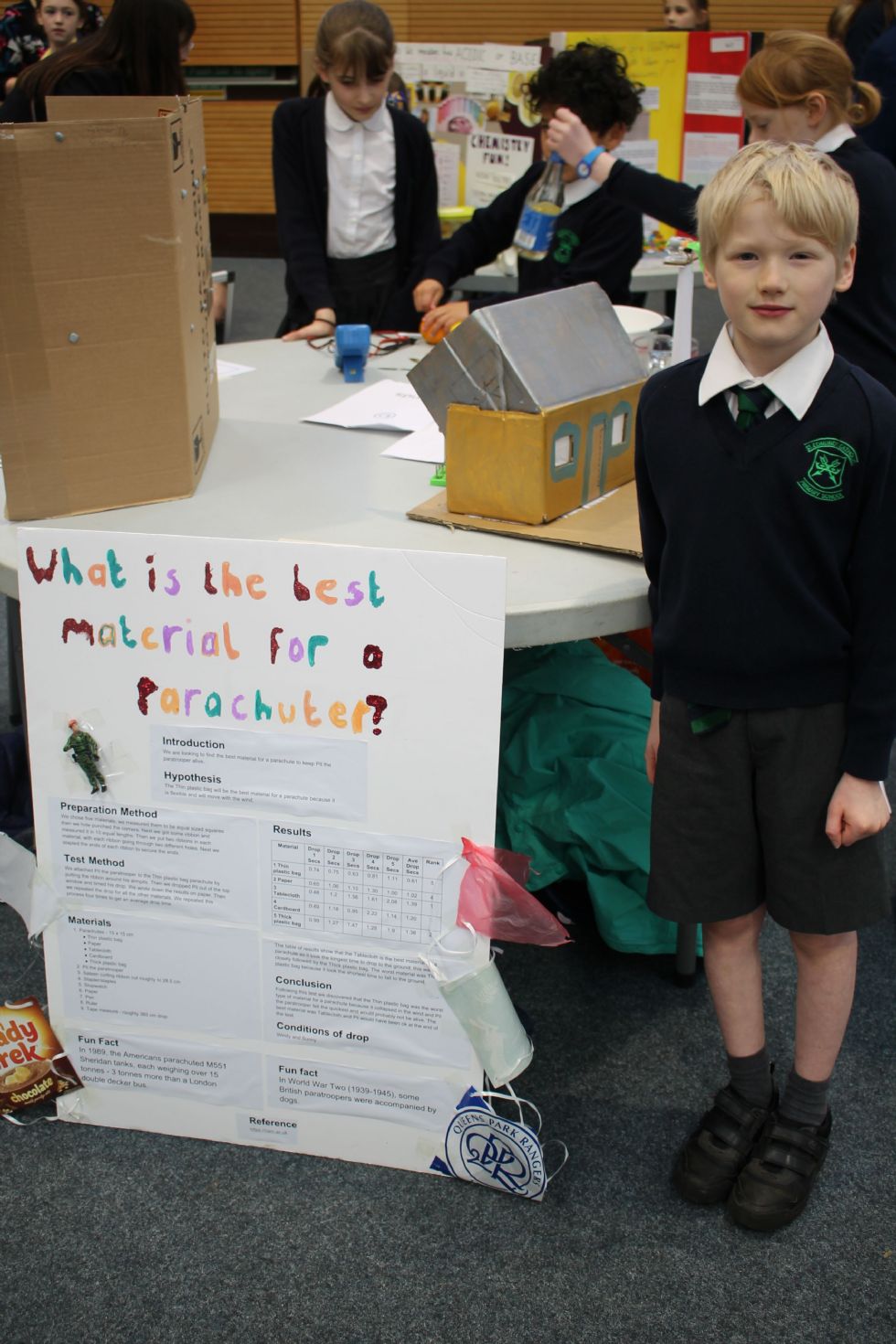Science
At St Edmund’s we aim to develop a sense of awe, wonder and curiosity about the natural world.
All ages groups have weekly science lessons (using both indoor and outdoor learning as appropriate) to foster their spirit of enquiry and encourage a questioning approach using practical investigations throughout the year. This is enriched by workshops, educational visits and an annual science week.
Science is a core subject within the National Curriculum. Our science learning is directly informed by (but not constrained to) the requirements of the National Curriculum.
Intent
At St. Edmund's we follow the Kapow Science curriculum, which aims to develop a sense of excitement and curiosity about natural phenomena and an understanding of how the scientific community contributes to our past, present and future.
We want pupils to develop a complex knowledge of Biology, Chemistry and Physics, but also adopt a broad range of skills in working scientifically and beyond. The scheme of work is inclusive and meaningful, so all pupils may experience the joy of science and make associations between their science learning and their lives outside the classroom.
Studying science allows children to appreciate how new knowledge and skills can be fundamental to solving arising global challenges.
Our curriculum aims to encourage critical thinking and empower pupils to question the hows and whys of the world around them.
Our scheme encourages:
● A strong focus on developing knowledge alongside scientific skills across Biology, Chemistry and Physics.
● Curiosity and excitement about familiar and unknown observations.
● Challenging misconceptions and demystifying truths.
● Continuous progression by building on practical and investigative skills across all units.
● Critical thinking, with the ability to ask perceptive questions and explain and analyse evidence.
● Development of scientific literacy using wide-ranging, specialist vocabulary.
Implementation
Science is taught as a discrete subject each week to children in both Key Stage One and Key Stage Two with cross-curricular links made where relevant. In reception, science is delivered through the EYFS ‘Understanding the World’ area of learning.
We teach the following key strands:
● Scientific knowledge and understanding of:
○ Biology - living organisms and vital processes.
○ Chemistry - matter and its properties.
○ Physics - how the world we live in ‘works’.
● Working scientifically - processes and methods of science to answer questions about the world around us.
● Science in action - uses and implications of science in the past, present and for the future.
Kapow Primary’s Science scheme is a spiral curriculum, with essential knowledge and skills revisited with increasing complexity, allowing pupils to revise and build on their previous learning. A range of engaging recall activities promote frequent pupil reflection on prior learning, ensuring new learning is approached with confidence. The Science in action strand is interwoven throughout the scheme to make the concepts and skills relevant to pupils and inspiring for future application. Cross-curricular links are included throughout each unit, allowing children to make connections and apply their Science skills to other areas of learning.
Each unit is based upon one of the key science disciplines; Biology, Chemistry and Physics and to show progression throughout the school we have grouped the National curriculum content into six key areas of science:
Plants
Animals, including humans
Living things and habitats
Materials
Energy
Forces, Earth and space.
Pupils explore knowledge and conceptual understanding through engaging activities and an introduction to relevant specialist vocabulary. The ‘working scientifically’ skills are integrated with conceptual understanding rather than taught discretely. This provides frequent, but relevant, opportunities for developing scientific enquiry skills. The scheme utilises practical activities that aid in the progression of individual skills and also provides opportunities for full investigations.
Each year group has an optional exploratory ‘Making connections’ unit that delves beyond the essential curriculum, assimilating prior knowledge and skills to evoke excitement and to provide an additional method of assessing scientific attainment.
Lessons incorporate various teaching strategies from independent tasks to paired and group work, including practical, creative, computer-based and collaborative tasks. This variety means that lessons are engaging and appeal to those with different learning styles.
Each lesson is adapted to ensure that all pupils can access learning, and there are opportunities to stretch pupils’ learning when required. Knowledge organisers for each unit help to identify prior and future curriculum links to make the scheme as meaningful as possible and reinforce key technical terms.
We supplement our weekly lessons with one-off workshops led by external experts and also leave the school premises for education visits. Past workshops have included, ‘the fossil man’, a stargazing workshop, a planetarium experience, and the ‘Life bus’. Past educational visits have included working with ‘Roots of the Future’ to plant hedgerows in the local environment, Winchester Science Museum, and Year 6 science visits to Charterhouse School to focus on the three main aspects of scientific learning in preparation for transition to secondary school.
Impact
The successful approach to the teaching of science at St Edmund’s leads to a strong understanding of the world which gives our children firm foundations for their secondary education to build upon. Our expectation by the end of Key Stage Two is for children to be able to develop their own questions, plan a variety of scientific enquiries to answer questions, and communicate their findings in a variety of ways. Children will also learn about some key scientists who have contributed to our understanding of the natural world, and an awareness of the role science plays in meeting challenges in the modern world.
The expected impact of following the Kapow Primary Science scheme of work is that pupils will:
● Develop early scientific thinking skills through hands-on exploration and sensory experiences in EYFS (Reception).
● Develop a body of foundational knowledge for the biology topics in the National curriculum: Plants; Animals, including humans; Living things and their habitats; and Evolution and inheritance.
● Develop a body of foundational knowledge for the chemistry topics in the National curriculum: Everyday materials; Uses of everyday materials; Properties and changes of materials; States of matter; and Rocks.
● Develop a body of foundational knowledge for the physics topics in the National curriculum: Seasonal changes; Forces and magnets; Sound; Light; Electricity; and Earth and space.
● Evaluate and identify the methods that ‘real world’ scientists use to develop and answer scientific questions.
● Identify and use equipment effectively to accurately gather, measure and record data.
● Be able to display and convey data in a variety of ways, including graphs.
● Analyse data to identify, classify, group and find patterns.
● Use evidence to formulate explanations and conclusions.
● Demonstrate scientific literacy through presenting concepts and communicating ideas using scientific vocabulary.
● Understand the importance of resilience and a growth mindset, particularly in reference to scientific enquiry.
● Meet the end of key stage expectations outlined in the National curriculum for science.
We assess our pupils using a wide range of approaches. Formative assessment includes day-to-day observations, interactions during class discussions and practical sessions, review of written work, and analysis of results. As a result, our teachers develop a rounded picture of the knowledge and understanding of each pupil. This informs our teachers’ planning for subsequent lessons to tailor their approach to meet the specific requirements of each class and, where needed, to correct any misconceptions or gaps immediately. This helps ensure we build secure scientific foundations for every child.
We also use ‘Pupil Voice’ to measure our children’s enjoyment of science at St Edmund’s. This helps us to ensure we meet our objective of instilling a real sense of wonder and passion for science.
To monitor our students throughout their time at St Edmund’s, we record each child’s progress at the end of each topic using our own school tracking system based on the National Curriculum. This enables staff to track progress in science throughout the school and tailor future lessons based on their prior learning and achievements, which informs Xavier Book moderations. This is supplemented by the subject leader and senior leadership team through lesson observations and scrutiny of students’ books to ensure our high standards are maintained.



